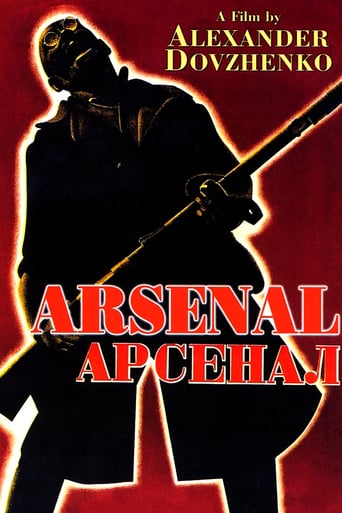Nate J
I'm having a difficult time coming to grips with Arsenal. The film follows a coherent narrative: a WWI soldier, Timosh, returns from the front to his hometown in Ukraine and sides with the Bolshevik workers in his former factory against a nationalistic anti-Soviet uprising. However, the story lacks narrative logic in a way that bugged me – a train carrying demobilized soldiers stops, the train is threatened by nationalist soldiers, the train starts again, the train has faulty brakes, the train crashes – scenes occur without any particular regard to the preceding context or the overall storyline. Add to this a dash of avant-garde styling – images of people apparently frozen in place, strange camera angles – and the effect is quite disorienting. Thematically and ideologically, though, the film is successful. Arsenal is remarkably even handed with regards to the conflict between the nationalists and the Bolsheviks. In one scene, a Ukrainian soldier laments "three hundred years of Russian oppression," to which a Russian soldier quite reasonably asks, "What did I do?" A frustrated peasant attacks his gaunt horse, to which the intertitles respond, "You're hitting the wrong one, Ivan." Ukrainian aggression against the Soviets is depicted as misguided, rather than malicious. All people, not just Ukrainians or Russians, are shown mourning and starving at the hands of the Germans and the negligent Tsar at the beginning of the film. Timosh's decision to side with the communists over the nationalists is not divisive; in the end he identifies himself as "a Ukrainian worker" to a nationalist squad, whose bullets he miraculously survives. Communism is universal, and the Bolsheviks do not deserve to be the target of nationalistic ire stirred by the Imperial era. The metaphor is obvious, but is refreshingly unintrusive for a revolutionary film. Arsenal is not easy to watch, but has more complexity to it than one might expect from a work of state-sanctioned cinema.
Teodor Georgiev
While I can understand why Arsenal is considered historic, it has not aged well. The scenes at the beginning of the film are confusing - we expect the film to be about the mother, only to find out she has relatively little to do with the film. By the time the main protagonist (Timosh) is established, a good chunk of the movie has passed. The acting is usually superb but drops when it should be at its strongest. It is hard to take the scene with the laughing gas seriously given how obviously the man is just acting. He doesn't move his arms or his body, and seems to only fall to the ground when he's taken off and put back on his glasses a certain number of times. Thankfully, scenes at the end of the movie redeem this level of acting. I'm also not sure what genre the director was going for. The military scenes suggested it to be an action movie, but besides those, I didn't see anything exciting. The movie then tries to be dramatic when one of the characters is about to shoot another in the back of the head, but can't manage. This had to be my favorite scene simply due to its originality. Even then, during the final few moments, when Timosh is being shot at, I couldn't take the movie seriously. His inability to die only reminded me of the final scene from V for Vendetta, and I found myself comparing him to a Ukranian V, with much less impressive equipment. This was the defining moment where the audience has to admit the movie is just too distant from modern audiences to be relatable. Everything it tries to do has already been re-done with better filming, special effects, and actors. It falls flat.
effigiebronze
I call this a near-masterpiece because of the basic purpose of it, which is propaganda. This film exists as agitprop, and while it contains phenomenal and ferocious imagery, ultimately the single-minded viewpoint hobbles it as art and undercuts its slight attempts at humanity. While it can be viewed as a Revolutionary piece, exhorting a 'proper' spirit of energy, knowing it was made by a Ukrainian in 1929 while the Stalinist regime was either plotting or bumbling their way to the Great Famine makes this film deeply questionable in a moral sense. The theme of a Ukrainian learning Revolutionary values in the Great War, then returning to destroy the 'corrupt' forces of 'old Ukraine' made me deeply uneasy. That said, the imagery and sequences in this (quite late) silent film are second to none. The toothless, laughing soldier is one of the most stunning single images ever committed to film; and the general pacing, with a deliberate, lingering sense of time, forces concentration on the set-pieces. Much of the film is brutal, inhuman, and cruel. This is both an accurate representation of the setting itself and of the type of violent us-vs.-them propaganda produced by the Soviets at the time. I find this film VERY unsettling from a moral standpoint, something I don't often find myself saying. But, again, the masterful and stunning imagery makes it well worth viewing more than once.
sean4554
For several years I had a decent quality print on video and was always fascinated by this film. Very few motion pictures are as visually striking and intense, but little of the story came through. I just purchased the DVD and the audio commentary track by Vance Kepley really illuminated "Arsenal". Undoubtedly the finest commentary I've yet heard. If this classic movie isn't your cup of tea, get the DVD anyway. Dovzhenko was an artist like few others. His work really deserves rediscovery; hopefully future releases of "Zvenigora", "Earth" and "Aerograd" will have Kepley's commentary as well. But even as they are, Dovzhenko's films are truly essential.



